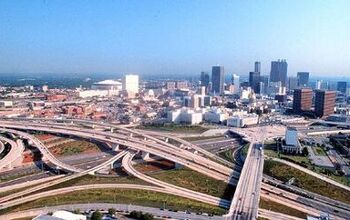Daily Podcast: The Party's Over
As you’ve no doubt read, your duly elected representatives have rejected the proposed $700b Wall Street bailout plan. What happens next is anyone’s guess. Congress will undoubtably go back to the drawing board and try again. The stock market will either recover, tank some more or stay the same. The U.S. economy will either recess, depress or re-decompress. However this plays out, one thing is for sure: the days of “Zero Percent Financing for Anyone With a Pulse” are done. Dead. Finished. Over and out. Credit’s tighter than a superglued lug nut. At the same time, the market’s awash with used vehicles that no one wants. Millions of “average” people are backwards on their car loans– and scared. Even if residuals rebounded and zero percent abounded, the manufacturers can’t lure them into more debt. So they will do the right (only?) thing:nothing. They will simply pay down their existing car loans and run what they got. Meanwhile, the domestic automakers will deflate, dehydrate and die. The U.S. car market will eventually recover, but it won’t look anything like it does today. And TTAC will be there to chart the changes.
More by Robert Farago


































Comments
Join the conversation
Well, Psh101, I wish the folks who do believe in this bailout would open up, have someone trusted by all sides sit down on TV on a "fireside chat" and explain it to all of us ignorant folks out here. In the meanwhile, some 95% of the population disagrees, along with "a few other people" http://www.cnn.com/2008/POLITICS/09/29/miron.bailout/index.html?iref=mpstoryview http://www.lewrockwell.com/rockwell/near-death-of-state.html http://www.wnd.com/index.php?fa=PAGE.view&pageId=76231
beetlebug, President Hoover didn't have much problem with aiding business, or trying to prop up failing business. His main beef was with direct relief to individuals (what we today call welfare and unemployment insurance). That was the primary difference between President Hoover and candidate Roosevelt. As governor of New York, Roosevelt presided over the only state in the union that had these programs. A big factor that contributed to the Great Depression was monetary policy. The federal government, fearing inflation, tightened the money supply. Only problem was this was the last thing that the economy needed. DEFLATION was the big problem. It was like trying to treat a man for a fever after he has already frozen to death. The government's actions throttled the economy. I don't know what action to take, to be honest. On the one hand, I can understand Pch101's concern for our financial infrastructure. But, on the other hand, I still believe the old saying that "depressions uncover what the accountants (or the media, or the pundits, or the 'experts') missed." The bottom line is that we need major corrections in two key sectors. Housing prices are out of line with incomes (especially in places like southern California and the Boston-Washington, D.C., corridor), and therefore the solution is to let prices fall. Propping up prices, or letting people "buy" homes with exotic loans that they have little hope of paying off are not answers. Prices need to fall, it will hurt some people, but it still needs to happen. In the automobile sector, it is apparent that quite a few companies (and not just GM, Ford and Chrysler - I'm looking at you, imported luxury marques) have survived by selling vehicles to people who really can't afford them. This is not a viable business plan. Again, something needs to give, and I think that several stalwart American nameplates - Mercury, Buick, Pontiac and Saturn - need to die. And BMW, Mercedes, Audi and Jaguar may not make it, either. How this should be handled to minimize pain, I'll leave to better minds than mine. But it has to eventually happen. Government aid should not be used to prevent what needs to happen from happening.